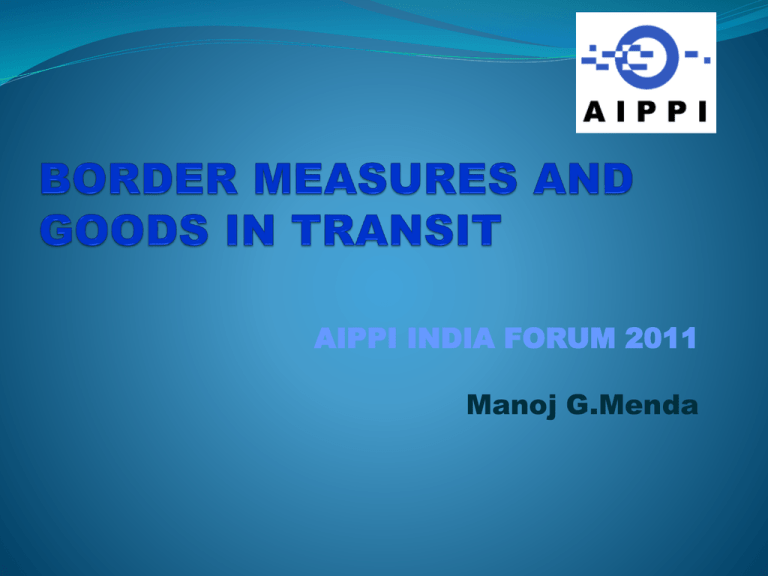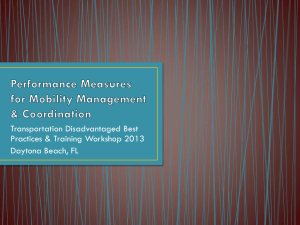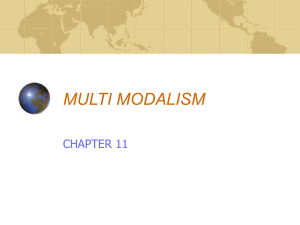BORDER MEASURES AND GOODS IN TRANSIT
advertisement

AIPPI INDIA FORUM 2011 Manoj G.Menda Minimum Standards of IP Protection International Intellectual Property Agreements such as TRIPS have looked at setting Minimum Standards of IP Protection which member countries need to adhere to. By increasing the levels of Minimum Standards of IP protection in the EU and in by some countries to TRIPS-Plus, it has resulted in a higher level of Enforcement by means of Border Measures. Thus the recent EU – Transit Cases. The practical result New International Intellectual Property Treaties have also gone beyond the minimum standards and flexibilities contained in TRIPS The concern of developing countries is to protect their public health and access to medicines. Result: Patent infringement issues become the ‘hot seat’ of debate far more than trademarks or any of the other forms of IP WTO Ministerial Declaration/ Doha Declaration “We affirm that the (TRIPS) Agreement can and should be interpreted and implemented in a manner supportive of WTO Members' right to protect public health and, in particular, to promote access to medicines for all” WTO Ministerial Declaration on the TRIPS Agreement and Public Health – 14th November 2001 Who are affected by stronger Border Measures ? Developing countries trying to run health programs for their citizens. Patients who don’t have access to health care in developing countries. Donor countries that fund treatment programs in developing countries (eg. USA, Japan) Countries that produce generics (eg. India) Countries that import generics (eg. Africa) Countries that want to produce generics (eg. Vietnam) The Indian SC on the issue of “Goods in Transit” Gramophone Company of India.vs. Pandey AIR 1984 SC 667. Gramophone Company of India Limited was the owner of copyrights. A consignment of pirated copies recordings was seized at Calcutta. The pirated copies were in transit from Singapore to Nepal through India. ISSUES CONSIDERED BY THE SUPREME COURT OF INDIA Whether the mere presence of goods in transit on Indian Territory amounts to their importation? Whether such goods in transit, which if made in India would infringe copyright, can be allowed on Indian Territory? The Supreme Court held that ‘import’ includes importation for transit across the country and accordingly there was infringement of Copyright. Infringement in Transit Country Infringement in the transit country is often the core issue such as for eg. in the patent space. Patent Infringement is judged on the basis of the Patent law of the transit country and not on the basis of the Patent law of the country of importation. India and Brazil, NGOs and organisations such as Medecins Sans Frontieres have viewed and commented that such EU border measures are “contrary to TRIPS” Other courts on the issue The Polo Ralph Lauren Company V. PT.Dwidua Langgeng Pratama International Freight Forwarders (European Court of Justice, 2000) HELD: ”Goods placed under this procedure are subject neither to the corresponding import duties nor to the other measures of commercial policy; it is as if they had not entered Community territory.” “there is a risk that counterfeit goods placed under the external transit procedure may be fraudulently brought on to the Community” OTHER GOODS IN TRANSIT CASES Montex Holdings Ltd v Diesel Spa European Court of Justice,2006 Montex made jeans. It exported different pieces from Ireland to Poland. Some pieces had Diesel trade marks. These exports were in transit in Germany and to be finally shipped to Ireland, where Diesel had no trade mark registration. Issues Considered: "1. Does a registered trade mark grant its proprietor the right to prohibit the transit of goods with the sign? 2. If the answer is in the affirmative: may a particular assessment be based on the fact that the sign enjoys no protection in the country of destination?" Held:- Not infringement. Trade Mark protection does not apply to goods in transit. OTHER GOODS IN TRANSIT CASES LOST IN TRANSIT! Nokia, and Philips 2011 cases Interpretation of EU customs regulations. To enforce their IP rights, Nokia and Philips will have get the infringing goods seized in the destination country of intended sale. Not in transit! EU – INDIA FTA IP protection measures is an issue that is being negotiated for signing an EU – India FTA. Border Measures are being discussed. Sharing IP Information is the key OWNERSHIP, TERM, and VALIDITY At the source, TRANSIT and DESTINATION Country must be disclosed and also be easily accessible to the Customs Enforcement Authorities on a global basis. Proposal For Harmonization Border Measures and Actions by Customs for “Genuine Goods” or “Generic Medicines” in transit must be handled and treated differently from goods that are clearly “Counterfeit” A model law could be prepared and circulated by AIPPI. The law should be harmonized based on TRIPS and not on the basis of any bilateral Trade Agreements. Thank you! menda@vsnl.com











